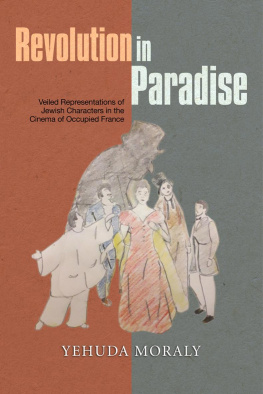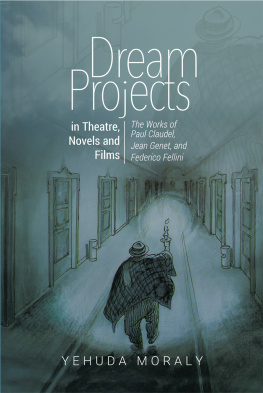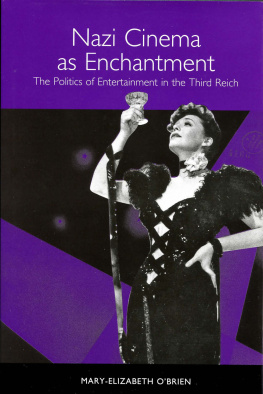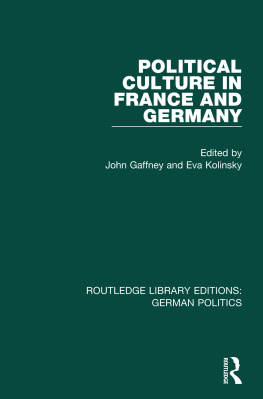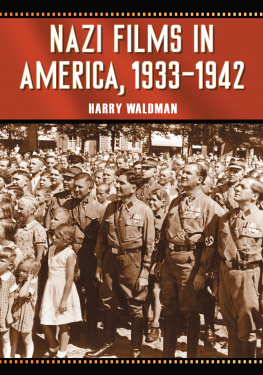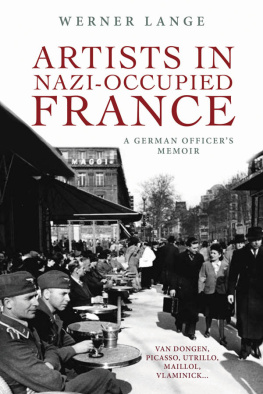Revolution in
Paradise
Revolution in
Paradise
Veiled Representations of
Jewish Characters in the
Cinema of Occupied France
YEHUDA MORLAY
Translated by Gila Kessous
Edited by Rona May-Ron
Copyright Yehuda Moraly, 2020.
Published in the Sussex Academic e-Library, 2019.
SUSSEX ACADEMIC PRESS
PO Box 139, Eastbourne BN24 9BP, UK
Ebook editions distributed worldwide by
Independent Publishers Group (IPG)
814 N. Franklin Street
Chicago, IL 60610, USA
ISBN 9781845197193 (Hardcover)
ISBN 9781782845843 (Epub)
ISBN 9781782845850 (Kindle)
ISBN 9781782845867 (Pdf)
All rights reserved. Except for the quotation of short passages for the purposes of criticism and review, no part of this publication may be reproduced, stored in a retrieval system, or transmitted, in any form or by any means, electronic, mechanical, photocopying, recording or otherwise, without the prior permission of the publisher.
British Library Cataloguing in Publication Data
A CIP catalogue record for this book is available from the British Library.
This e-book text has been prepared for electronic viewing. Some features, including tables and figures, might not display as in the print version, due to electronic conversion limitations and/or copyright strictures.
Contents
Foreword by Rgine-Mihal Friedman
Acknowledgements
Introduction
P ART O NE
Filmic Representations of Jewish Characters: Explicit and Implicit
Direct Anti-Semitic Propaganda
The War on Memory
The Gypsies as Allegorical Jews: Le Camion blanc (The White Truck, Lo Joannon, 1943)
An Homage to Hitler: Lternel retour (The Eternal Return, Jean Cocteau, 1943)
The Ominous Visitors at the Splendid White Castle: Les Visiteurs du soir (The Devils Envoys, Marcel Carn, 1942)
P ART T WO
Les Enfants du Paradis : A Different Perspective
Introduction to Part Two
From Page and Stage to Screen: The Theatrical Sources of Les Enfants du Paradis
From Ptain to De Gaulle: The Genesis of a European Super-Production during the Black Years
The Archeology of a Vanishing Murder: The Character of the Old-Clothes Man
Redefining Paradise: Making Place for a New Human Order
Conclusion
Notes
Bibliography
Filmography
Index
Foreword
It is indeed an unveiling, if not a revelation, to which Yehuda Moraly invites us in his remarkable book, Revolution in Paradise , devoted to the golden age of French cinema which flourished during the darkest years of the German Occupation during World War Two.
This solid, fascinating, comprehensive research scrupulously scrutinizes the numerous studies that have recently proliferated around a very strange paradox: a series of dazzling, unforgettable films appeared on French screens while the nation under the boot of the hereditary enemy suffered, in addition to material privations, myriad restrictions on its most essential liberties. Most of these studies, emanating from distinguished scholars, do recall the tragic fate of the Jewish minority, ostracized by the Vichy regime. They even acknowledge that there were isolated cases of French anti-Semitic films, usually documentaries, in the tradition of the Nazi propaganda repertoire, such as Le Pril juif , a translated adaptation of Der Ewige Jude (The Eternal Jew, 1940), a film by Fritz Hippler, Goebbelss deputy. However, these same studies unanimously and firmly underscore that most of the feature films made at the time refused to echo the anti-Jewish laws promulgated by the Vichy government. Furthermore, they claim that the films refrained from endorsing Vichys policy against a gradually isolated, persecuted community whose members among them film producers, directors, actors were soon to be concentrated in various transit camps in France before being deported to the death camps of Eastern Europe.
In his copious and skillfully-documented work, Moraly faces a double challenge. First of all, he rejects the currently and complacently accepted hypothesis of a cinema that granted a certain space, precarious as it may have been, for creative freedom that allowed some films to convey seditious messages that undermined the occupiers to the extent that nowadays they might even be considered anti-Nazi manifestos. Such a reading was imposed upon the last scene of Les Visiteurs du soir (The Devils Envoys, Marcel Carn, 1942): the Devil an incarnation of Evil whips the statues of the closely entwined lovers that he has just petrified, and whose hearts, despite the blows, continue to beat loudly. This interpretation wants to see in this superb finale the victory of love and loyalty: an unquenchable resistance to the cruelty and hatred that France suffered under the yoke of Hitlers Germany.
Secondly, these stories of indestructible love, often inserted into a fabulous or mythical past, these subtly written and ever so poetic screenplays, especially when they are signed by Jacques Prvert, these mise-en-scne of unmatched elegance, with refined innovations such as a duel between two knights reflected in the water of a fountain wished to liberate their audiences, even if only for a few moments, from the rigors and trials occasioned by the war. Yet, according to Moralys conclusive argument, escape was not the aim they sought.
In order to prove his thesis, which rejects the aforementioned widespread opinion regarding the absence of any anti-Semitic prejudices in the cinema of the dark years, Moraly employs different methods. One of them is to compare the various strategies implemented at different stages of the production of the most prestigious films of the time, taking into account that a film production, especially in wartime, can extend over months, and in the specific case of Les Enfants du Paradis (Children of Paradise), for years (19421945).
Moraly reveals, for example, how the initial screenplay may differ from the final version or how certain cuts some shots removed or replaced can completely transform the meaning of a work. However, in the cases he examines, these significant changes depended not so much on the demands of producers a common practice in the development of a film but rather on the upheavals of History in troubled times: more specifically on whether the Allies or the Axis were victorious. Recounting the stages of the production of Les Enfants du Paradis , Moraly writes:
The film available for viewing today is neither the one that was initially written nor the one that was eventually shot. The unforeseen upheavals that occurred in the span of time it took to write, shoot, and edit the film between 1942, when the film was first conceived, and 1945, when the film was released make the various versions of the films screenplay a fascinating subject of study. In 1942, when Carn and Prvert conceived the project, German victory seemed certain and a new Europe was taking shape. Berlin wanted to make Paris the European cultural capital and turn the Victorine Studios into a cinematographic center whose prestige would rival that of Hollywood. However, the capitulation of Italy in 1943, while filming was underway, undermined the assured German victory. In 1944 and 1945, while the film was being edited, German defeat was imminent and the purging committees were working overtime.
Moraly demonstrates these opportunistic tactics not only through the countless texts and documents which he consulted, whether written or filmed, but he also corroborates them through many conversations and encounters with prominent personalities of this generation or their descendants throughout the fifteen years of his tenacious investigation.

